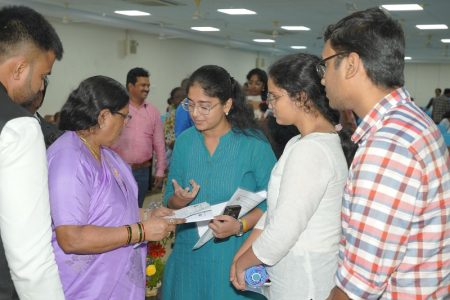Visakhapatnam: The National Human Rights Commission (NHRC) of India, in collaboration with Damodaram Sanjivayya National Law University (DSNLU), hosted a day-long open house discussion on the rights of fishermen at the DSNLU campus in Visakhapatnam. The event, chaired by Smt. Vijaya Bharathi Sayani, Acting Chairperson of NHRC, concluded with a range of significant recommendations aimed at improving the human rights conditions of fishermen in India.
In her opening remarks, Smt. Sayani emphasized the pivotal role of the fishing community in bolstering India’s economy. She asserted the importance of safeguarding their rights to ensure they can maintain their livelihoods with dignity. “The Commission is committed to protecting the rights of fishermen,” she said, highlighting the NHRC’s ongoing initiatives to defend the rights of seafarers and other vulnerable groups. She also discussed the various advisories issued by the Commission to central, state, and union territory authorities to protect these rights.
The discussions were divided into three technical sessions, each focusing on different aspects of fishermen’s rights and challenges.
Human Rights Violations of Fishing Communities
The first session delved into the human rights violations faced by India’s fishing communities. Speakers underscored the critical role of fisheries in the national economy and the hazardous conditions under which fishermen work. Despite existing legal protections, human rights abuses continue to plague the community, making awareness-building efforts crucial. Emphasis was also placed on the need for sustainable fishing practices, climate resilience, and international cooperation. Prof. E. Udaya Bhasker Reddy from Andhra University highlighted the right to a healthy environment and the impact of pollution, stressing the importance of respecting nature. Dr. Deepa Suman of the National Fisheries Development Board (NFDB) discussed the benefits of the Pradhan Mantri Matsya Sampada Yojana, which supports the fishing community through safety measures, insurance, and infrastructure development.
Fishing Rights and Environmental Issues
The second session focused on fishing rights and environmental issues. Dr. Joe K. Kizhakudan from ICAR-CMFRI outlined the challenges faced by fishermen in Andhra Pradesh due to poor governance, contrasting them with better conditions in Maharashtra and Tamil Nadu. He noted that some fishermen from Srikakulam are migrating to Odisha due to unfavorable conditions in their home state. Dr. S.S. Raju, also from ICAR-CMFRI, discussed the generational entrapment in fishing, lack of alternative employment, poor living conditions, and the environmental degradation caused by industrial waste. He called for the establishment of Minimum Support Prices (MSP) and improved safety measures. Dr. Divya Karnad of Ashoka University and Prof. V. Raja Lakshmi, formerly with Andhra University, stressed the importance of protecting traditional fishermen’s rights and providing essential services, while advocating for both community and individual approaches to support their welfare.
Social Security Measures and Welfare Schemes
The final technical session covered social security measures and welfare schemes for fishermen. Dr. Ch. Benarji, Dean and Professor of Law at VIT-AP University, highlighted the legal challenges faced by Indian fishermen arrested for crossing into Bangladeshi waters. He emphasized the need for education on maritime laws and the law of the sea, urging law schools like DSNLU to engage in outreach and education efforts for fishermen. Dr. Benarji also discussed the complexities of unclear sea boundaries, particularly around Katchatheevu, and advocated for legal frameworks and insurance coverage to protect fishermen who inadvertently cross international waters.
Community Voices and Conclusion
In the concluding session, representatives from the fishing community were given the floor to articulate the pressing challenges they face. They highlighted the limited awareness of government programs and the harmful effects of illegal coastal development and pollution on their livelihoods.
The event was attended by representatives from the Department of Fisheries, Government of India, professors from various academic institutions including Andhra University, Ashoka University, and the Indian Council of Agricultural Research (ICAR), Central Marine Fisheries Research Institute (CMFRI), as well as members from international and national NGOs, CSOs, and private institutions. Around 50 fishermen and their families also participated in the discussions.
The open house concluded with a renewed commitment to addressing the challenges faced by India’s fishing communities, ensuring their rights are upheld, and their contributions to the economy are recognized and supported.

